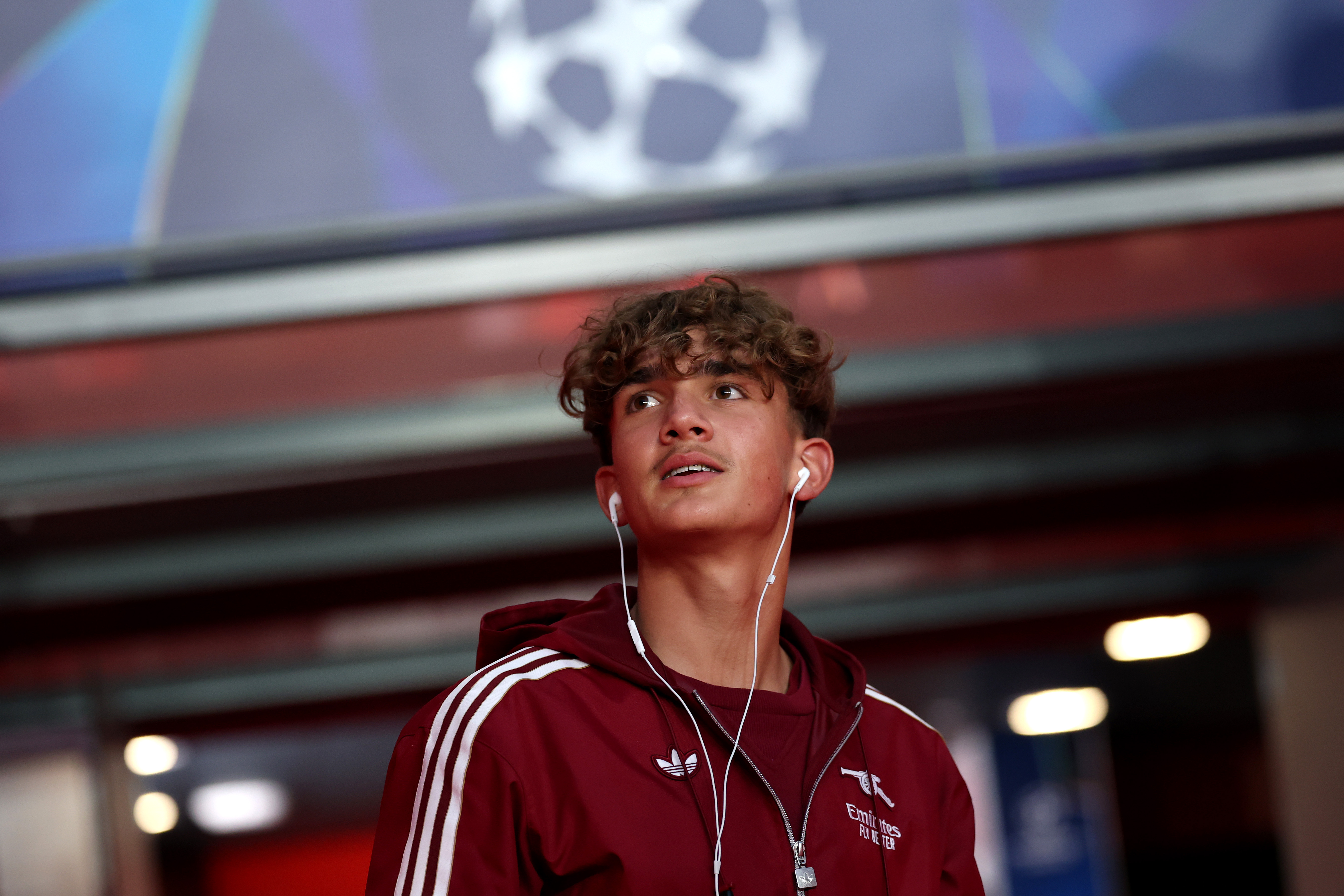David Ginola interview: “People said I was more focused on modelling and L’Oreal – I wanted to prove them wrong”
Former Newcastle and Tottenham star David Ginola arrived in England in 1995 with journalists asking him who he was – then picked up the Player of the Year award aged 32...
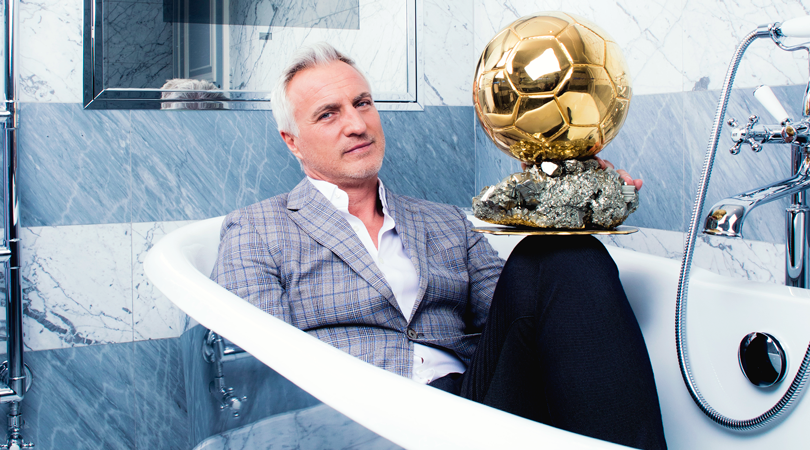
David Ginola was ranked at number 51 in our 100 greatest Premier League players. See the full list here.
Nearly 26 years on, David Ginola can still remember the bafflement he felt at his first press conference in English football.
Ginola had just joined Newcastle United from Paris Saint-Germain for £2.5m – a considerable sum in 1995. He had reached the semi-finals of the Champions League months earlier and been targeted by Europe’s biggest clubs. He was poised to become the second Frenchman to play in the Premier League, after Eric Cantona. But not everyone was aware of his talents.
“When I arrived at the first press conference, a journalist said, ‘Can you tell us who you are?’” says Ginola, smiling as he reminisces to FourFourTwo. “In Paris, we’d won the league title, we’d won the cup twice and I’d been French player of the year. But I was completely unknown to the English press, which surprised me.
“I replied, ‘What do you mean, who am I?!’ The English press didn’t know much about French players then – now, they know everything about them. But I was a surprise for them, a discovery, that ‘Oh, this is a great player’.”
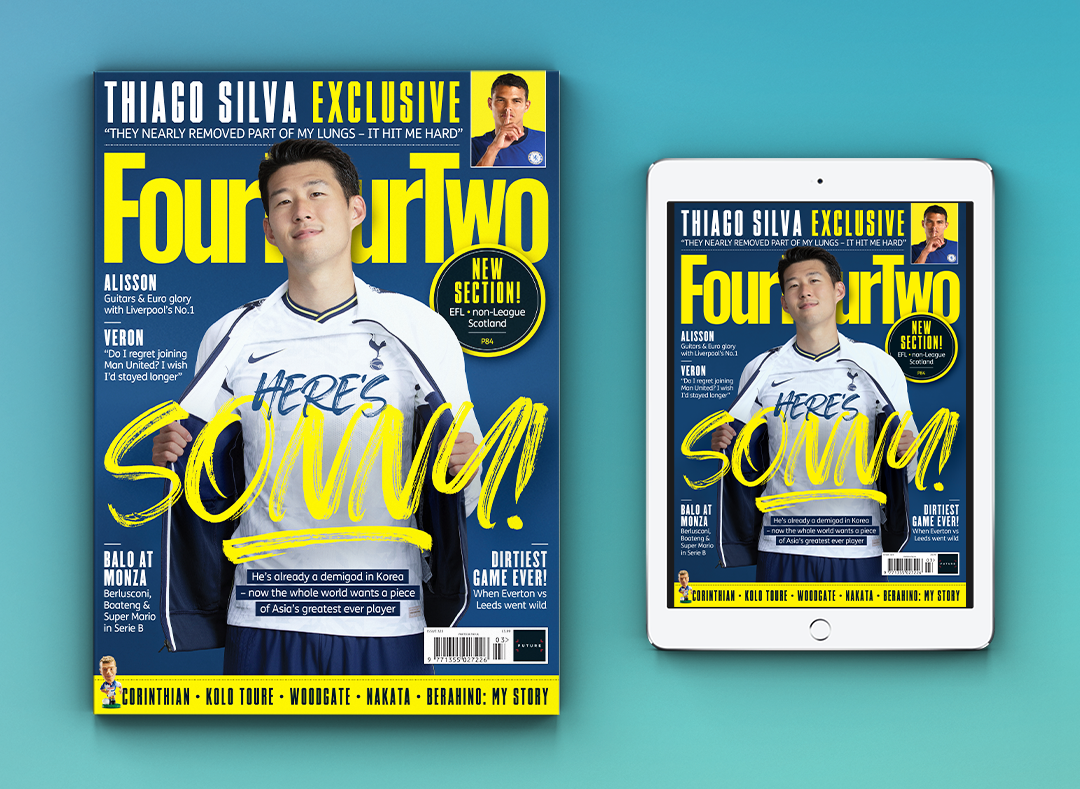
Ginola was Premier League Player of the Month just four matches into his time at Newcastle, and would become one of the biggest stars of the next few seasons – named both PFA and Football Writers’ Association Player of the Year after moving on to Tottenham Hotspur in 1997.
With his good looks, musketeer locks and swashbuckling dribbling, the French left-winger stood out so much that he sometimes resembled the lone pro on the field, carving his way through a rearguard of over-matched amateurs. Few could dazzle quite like David Ginola.
The best features, fun and footballing quizzes, straight to your inbox every week.
This David Ginola goal for PSG vs Real Madrid in the UEFA Cup is 27 years old today.Magnifique, old son. Magnifique.pic.twitter.com/cYa6l0IRv9March 18, 2020
Newcastle was not Ginola’s dream move in the summer of 1995 – initially, at least. Having helped PSG eliminate Barcelona from the Champions League, the 28-year-old looked set to link up with his childhood hero Johan Cruyff at the Camp Nou.
“I had two posters in my bedroom when I was young – one of Cruyff and one of Diego Maradona,” reveals Ginola. “Cruyff was my inspiration – the way he played, the way he behaved. I met him at a golf tournament in Tarragona, south of Barcelona, and he told me I was his priority that pre-season. Barça under Cruyff played some of the greatest football ever, so it would have been something magic.
“Everything was organised, but he said he had to get rid of two foreign players before signing me – Hristo Stoichkov and Gheorghe Hagi. They couldn’t find clubs for them, and I got a call from Cruyff saying, ‘I’m sorry, we can’t make the move’.”
Soon, Ginola discovered that Kevin Keegan wanted him at Newcastle. “I found that very attractive,” he says. “When I was about nine years old, I told my dad that I wanted to be a footballer. I said that while I was watching Liverpool vs Saint-Etienne in the European Cup, when Keegan was playing for Liverpool. I had a good phone conversation with Terry McDermott, the assistant at Newcastle, and said, ‘OK then, let’s do it’.”
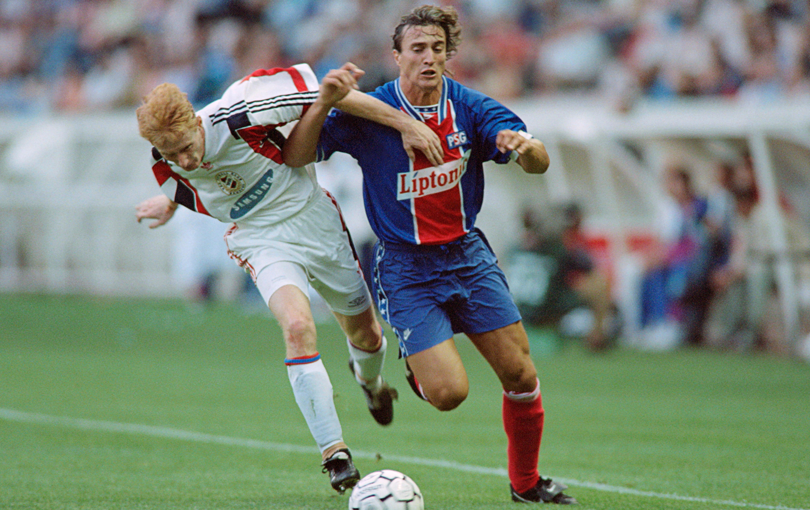
Newcastle weren’t the only English team interested. “I gave my word to Terry in the afternoon, then around midnight I got a call from David Dein at Arsenal,” recalls Ginola. “He asked, ‘Have you signed for anybody?’
I said, ‘Well... why?’ and he said, ‘Because we want to sign you’. I said, ‘Actually, I gave my word to Newcastle, sorry – the deal is done’.” Had Dein’s call come a day earlier, Ginola admits that he might have been tempted to choose the Gunners.
“Arsenal were one of the biggest clubs in the country, while Newcastle had just moved from the First Division to the Premier League and still had to prove they were a great side,” he says. “The decision would probably have been different. But when I called my dad and said, ‘I’m signing for Newcastle and working with Kevin Keegan,’ he was happy.”
Ginola was joining an ambitious outfit, just as he had done twice before in France, albeit with limited success. He had moved to Matra Racing from Toulon in 1988, only for the club to suffer financial problems and relegation to the amateur leagues.
David Ginola scores a screamer for Newcastle United, 1996. pic.twitter.com/Zz2XHEQYCiAugust 1, 2018
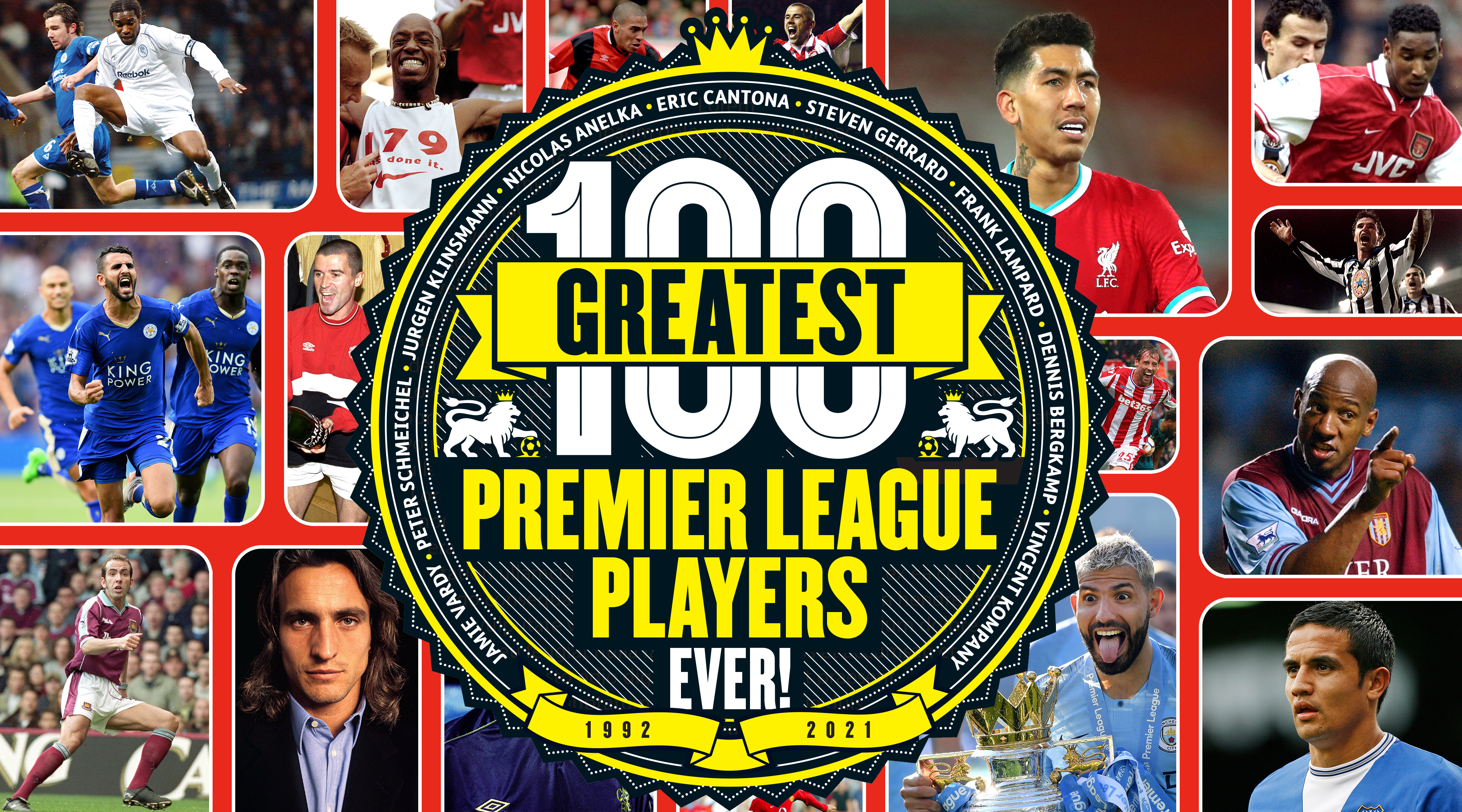
BEST PREMIER LEAGUE PLAYERS EVER 100 greatest footballers in England's top flight since 1992
He rocked up at recently promoted Brest, who finished 11th but were kicked out of the top flight because of their own money woes. Months into the 1991-92 season, they filed for bankruptcy, permitting Ginola to join PSG as a free agent, where his obvious talent was harnessed in the quest for titles.
At Newcastle, he experienced none of the issues he’d had with Matra Racing or Brest. Although he was surprised to be employed on the left flank, having often operated as a No.10 in Paris, ‘Le Magnifique’ loved every second of his time under Keegan.
“He got the best out of every player,” says the Frenchman. “He said, ‘David, I know what you’re capable of – just do what you’re good at. I don’t want you to defend much – give me your best in attack and put as many balls into the box as possible for Les Ferdinand’.
“I tried to entertain and be very positive in every match. In England, the game was a lot quicker; it was intense, exciting, instinctive. I liked it. That’s how we played at Newcastle – instinctive football.”
The August 1995 Player of the Month prize soon dispelled any doubts that Ginola would succeed. In the third game of the campaign at Sheffield Wednesday, he smashed home a stunning long-range strike to extend the Magpies’ winning start.
QUIZ! Can you name the top 60 scoring nationalities in Premier League history?
“The media in France said English football wouldn’t suit my game, and I always wanted to prove people wrong,” he says. “I remember that game against Sheffield Wednesday. Our players were taking the mickey out of me, as I was coming from Paris with my fashion, and they said, ‘David, do you know much about Sheffield?’ I said, ‘Er, no, not really’. They said, ‘You’ll see, it’s a very tough place’. I replied, ‘That’s OK, wherever we play, it will be fine’.
“I tried to do my stuff during that game, and it was appreciated. On the way back to Newcastle, we had a drink in town with the lads to celebrate, and the Newcastle fans were falling on their knees! I didn’t experience that in France – it was good there, but not that much. The reception I always received at St James’ Park was like being at home with your family – they cheered when you did things, and they expected a lot from you. It was great, to be honest. It was great playing for Newcastle.”
By mid-winter, Ginola’s performances had helped Newcastle surge clear at the top of the table. “I’d call my mum and she’d ask, ‘How’s the weather there today?’” he reflects. “I’d say, ‘The weather is grey and it’s pouring down with rain’. She’d say, ‘David, the sun is in your heart and in your soul’.
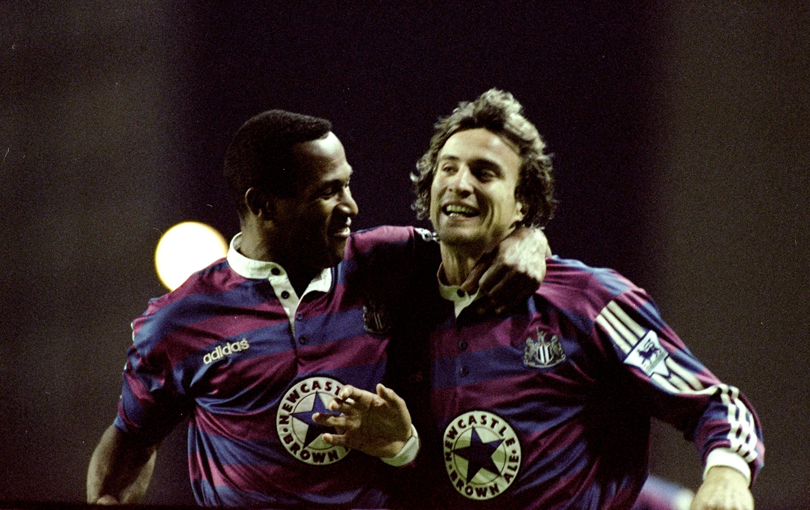
“I went to training every morning with that in mind – give sunshine to people. If you do that, you usually get something back. Then we were top of the league and 12 points clear – it was out of the blue. Nobody had expected Newcastle to do quite so well, and so quickly.”
In the end, the title race pivoted on a battle against his compatriot Cantona.
“It was a big rivalry set up by the press, but it wasn’t the case,” insists Ginola. “Eric was playing very well for Manchester United, and I tried to help my team. His goal at St James’ Park [in Manchester United’s 1-0 March win] was key. We were disappointed, as we played so well, we entertained so much, and I think we deserved to win the league that year.
CHAMPIONS LEAGUE Buy the new knockout stages ball now
“Maybe we could have done some things differently, managing the last 20 minutes of matches when it was 1-1 or 1-0. Sometimes 1-0 is enough. It was a lack of experience. It was a shame because to arrive in England and win the league in my first season would have been something amazing.”
Newcastle briefly led the league again the following season, after Ginola scored another cracker as Manchester United were thrashed 5-0 on their St James’ Park return.
“In the dressing room after the game, we thought, ‘We’ve just done something great there’,” he says. “We had incredible players – Alan Shearer had joined that summer, plus Les Ferdinand, Peter Beardsley and Faustino Asprilla. Many of the players I’d never heard of when I first arrived but realised were great, like Lee Clark, Steve Watson, Keith Gillespie, Robbie Elliott, John Beresford, David Batty, Darren Peacock, Rob Lee... I can’t name all of them, but brilliant players.”
Ginola was awarded BBC Goal of the Month for a sensational UEFA Cup effort at home to Ferencvaros in October, when he juggled the ball outside the penalty area before volleying it into the top corner. But his stay at St James’ Park lasted just two seasons, having grown unhappy under new manager Kenny Dalglish following Keegan’s shock mid-campaign exit in January 1997. It had been Keegan who’d blocked another opportunity to join Barcelona before the start of 1996-97.
“Keegan called me and said, ‘David, we’re not going to sell you’,” explains Ginola. “I said, ‘Gaffer, if you were in my position at 29, this is the last chance for me to go to one of the biggest clubs in the world – you have to sell me’. He said, ‘Last year I let Andy Cole go to Manchester United and was almost killed by the fans – if I let you leave now, it’s going to be a massive issue for me’.
“I could understand it and told him that because I felt great at Newcastle, I’d carry on working like I did in the first season. But at the time I thought the decision was a selfish way of thinking, especially because he left six months later.
“Newcastle without Keegan was different – the way we trained and the approach. Kevin is a kind and gentle person, putting an arm around your shoulder. Dalglish was colder, and I soon realised that I wasn’t the type of player he’d sign or keep.”
Ginola’s departure from Newcastle would be sealed thanks to a mad speedboat ride on the Mediterranean. He was back in the south of France for the summer – having grown up a few miles from Saint-Tropez – when Spurs’ £2.5m offer was accepted.
“[Chairman] Alan Sugar said, ‘I’m anchored in Villefranche-sur-Mer, just outside Monaco – can you come and see me on my boat?’” continues Ginola. “I was going to make the deal on the boat but it was July 14, which is a national holiday in France. A lot of the roads are busy, so I thought, ‘If I drive by car from Saint-Tropez to Monaco, it’ll take ages – three or four hours’.
“I called a friend and said, ‘I need to go to Monaco as quickly as possible’. He said, ‘Give me an hour,’ then called back and said, ‘I’ve got a boat’. We left Saint-Tropez in the boat, going at 40 knots [45mph] on the sea. It was wild! In 58 minutes, we arrived.
PREMIER LEAGUE 6 records that could be broken this season
“Sugar was standing on the side of his boat – 50 metres long, a big thing called Louisiana – and kept shouting at us. I couldn’t work out what he was trying to say, but he was making lots of arm gestures. I thought, ‘What’s going on? Maybe he’s changed his mind!’
“He was really annoyed about the noise of the speedboat, but then he spotted me and said, ‘Oh, it’s you!’ I asked him why he’d been shouting and waving at us and he said, ‘I’ve just spent a week with my grandchild. I need some quiet now!’
“I went on his boat and he told me about Tottenham, then after dinner it was dark and he said, ‘You’re not going back to Saint-Tropez on a speedboat tonight, it’s dangerous. You’re a Spurs player now, and you can sleep here’. We talked more and he made plans, saying, ‘You’re going to arrive at White Hart Lane and we’ll make a bottle of Gin Ola.’”
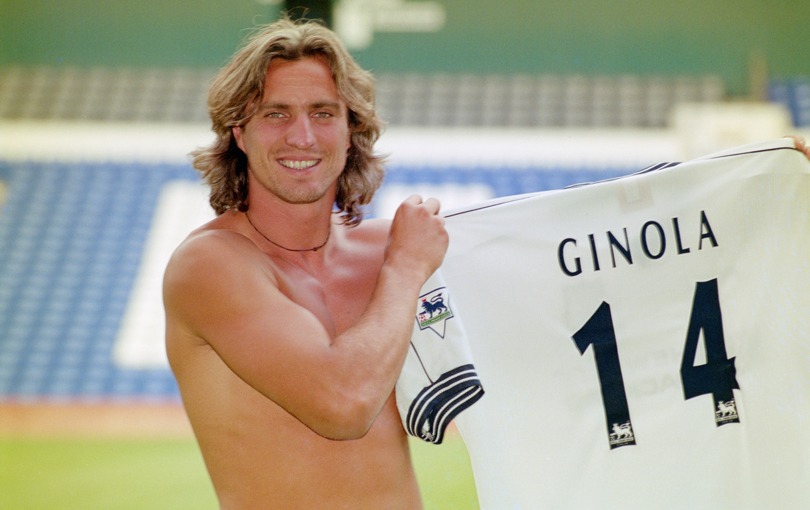
Tottenham had finished 10th prior to the Frenchman’s arrival and slipped to 14th in his first campaign at the club, battling against relegation for much of the 1997-98 season. Despite that, he was a star player for his new side and knew he had made the right move. “Even if the club wasn’t pretending to win things, I tried to be very consistent with my performances,” he insists. “I felt great there. Maybe it was the fact the players, the staff and the fans were relying on me a lot. I liked that pressure – it gave me even more power and I felt that from the beginning. I thought, ‘Let’s make the club better’.
“I’d speak to supporters after games, and some people cried, saying, ‘David, thank you so much. We’re playing such bad football but you’re giving us something to cheer us all up’. Wow, when people are crying, that’s a huge responsibility. My family travelled to see some of my games and said, ‘When the ball comes to you, there’s a silence in the stadium – we can sense the anticipation building because the fans expect you to do something great’. I enjoyed that – I always knew I needed to do something on the pitch.”
That summer, Ginola had to watch on as France won the 1998 World Cup Final in Paris, believing he had the talent to be a part of it. He had been blamed by some – including former boss Gerard Houllier – for Les Bleus’ failure to qualify for the 1994 tournament, when he had opted not to protect the ball in the corner for the closing seconds of a vital game against Bulgaria.
LIST 10 European trophy-winning teams who were terrible domestically
In 1998-99, however, Ginola emphatically displayed his ability, despite the early-season arrival of renowned disciplinarian George Graham as manager. “The press said George Graham wasn’t suitable for me – he wasn’t the coach who’d give me the opportunity to express myself in the team,” he remembers. “But that was wrong. They didn’t know the person I was. That season was something magic, as I worked even harder in training under George, just to prove everyone wrong. I ended the season with the League Cup and PFA Player of the Year award. What else was there to say?”
Arguably the finest moment was Ginola’s individual goal at Barnsley in March 1999, where he picked the ball up on the left flank, rhythmically darted both right and left like a slalom skier, then nonchalantly stroked the ball home from inside the penalty area. “It was the perfect illustration of the season,” he says. “It’s 0-0 in the quarter-finals of the FA Cup. Everyone is watching you, expecting you to do something amazing, and then you do your stuff. I can’t really explain how you construct a sequence that will end up with a goal. Everything was just very fluid, and it turned out perfectly.”
With Tottenham fans delirious behind the goal, what did that moment feel like? “Crap, it feels crap...” he replies, mischievously trying to stay deadpan, before he’s unable to suppress the laughter any more.
“It feels amazing! It feels amazing because you’ve just scored, it feels amazing because you know you’ve just scored a great goal, and it feels amazing because you win the match 1-0. The whole thing put together meant a lot.”
In the season when Manchester United won their famous Treble, 32-year-old Ginola became the first player of the Premier League era to win the PFA award without playing for a top-two team – Spurs finished 11th. Gareth Bale (twice, also for Tottenham) is the only other player to win the award for a side that didn’t finish in the top four.
“When I got to Grosvenor House for the awards ceremony, I bumped into [PFA chief executive] Gordon Taylor and he said, ‘David, how are you doing?’ with a tiny smile,” recalls Ginola.
JACK TOOTH In defence of the referee: what ex-pro pundits are getting wrong
“I asked him, ‘Why are you smiling?’ He said, ‘You’ll see...’ It was a surprise when my name was announced – I went on stage and didn’t know what to say. We had a party afterwards – Nicolas Anelka won the Young Player of the Year award, and he came up to me and said, ‘You’re an inspiration’. I wasn’t sure about those moments, because some people said David Ginola was an individual on the pitch, but I was a team player. I’d rather have changed it for the league, but it was great anyway.
“To win it at 32 years old was an explanation to people who said David is more focused on his modelling or advertising for L’Oreal. That wasn’t true – you can’t be player of the year at 32 if you’re not 100 per cent committed to your job.”
Ginola won the Football Writers’ Association prize, too. That year, Cruyff also hailed him as the best player in the world.
“That was the best award of all,” enthuses Ginola. “When you’re 10 years old and you’re a massive fan of a player, then one day he wants to sign you, that’s some achievement. If you add what he said in 1999, I’m not sure how to explain how I felt, because it wasn’t a question about me. He was just asked, ‘For you, who’s the best player in the world right now?’ and he said David Ginola. Wow, thank you very much.”
Just a year later, Ginola was shocked to be made surplus to requirements at Tottenham.
“I would have loved to end my career at Spurs,” he says. “Alan Sugar called me in the summer and said, ‘I have something to tell you – you’re going to be on the transfer list’. I said, ‘What?! What do you mean?’ He told me that George Graham didn’t want me any more. I said, ‘You’re going to have to explain this to the fans, because I’m not saying it’s David Ginola’s decision’.”
After an unexpected meeting with Aston Villa chairman Doug Ellis while on holiday in Mauritius, a move to the Midlands was sealed. “We had a nice lunch and he said, ‘We’d love to have you at the club one day’,” remembers Ginola. “I said, ‘Well, funnily enough, I’m on the transfer market...’”
But his 18 months at Villa Park were largely unhappy. The most notable moment was a blockbuster strike against Manchester City when the Frenchman removed his shirt and flexed his muscles to prove a point to gaffer John Gregory, who had claimed the winger was out of shape. He looked anything but.
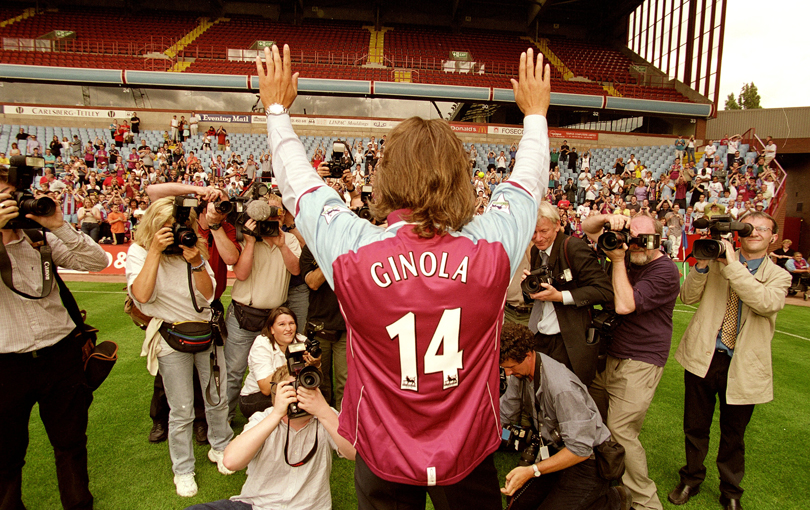
“It was a very weird relationship with John Gregory,” explains Ginola. “You arrive in the morning, there’s a newspaper, and you see all the players laughing in the dressing room. On the back page, it showed my head on the body of Jimmy Five Bellies, and the headline was John Gregory saying that David Ginola is Mr Blobby. When you’re trying your best to get into shape, it was a humiliation, so when I scored that goal I wanted to say, ‘Look at me – you’re saying I’m Mr Blobby?’
“I need to like my manager and respect him. If you don’t like me, don’t expect me to like you. I thought, ‘No, I’m making my effort and if that’s not good enough for you, it’s not going to work’.”
After seven brief appearances at Everton in 2001-02, Ginola retired at 35. “I lost the little flame – it’s within your soul,” he says. When he looks back on his career, there’s plenty of pride, but also a feeling that he was capable of even more.
“That’s what I think, if I look in the mirror,” admits Ginola. “If I’d played for a team like Barcelona, I probably would have played at Euro 96 and the 1998 World Cup. I never got to play at a major tournament, which is a big shame, because playing for France at a World Cup, and winning it, really would have been something amazing. And I think... well, I don’t want to say it, but I think I deserved to be in that 1998 squad.”
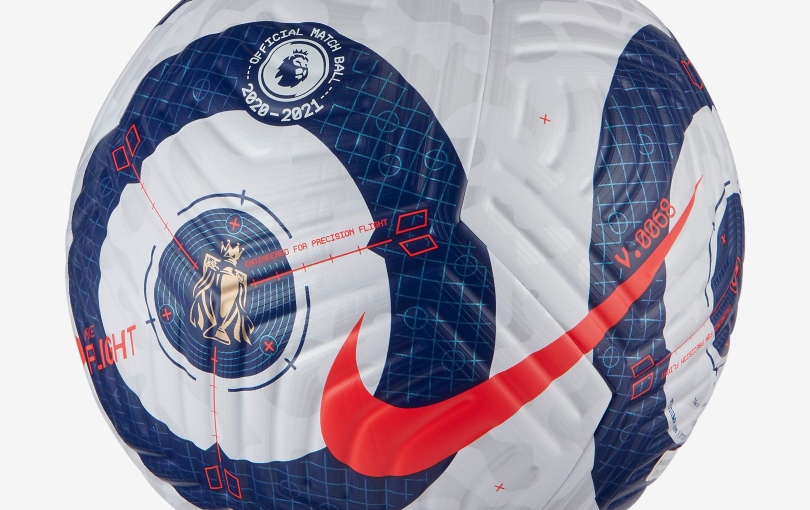
NEW PREMIER LEAGUE BALL Latest Nike Flight brings back retro vibe for the rest of the 2020/21 season
His spells at Newcastle and Tottenham may not have earned him a spot at a tournament, but they established a bond that will always remain special to Ginola.
In the 18 years since his retirement, the Frenchman has worked as a TV presenter and an actor, as well as briefly standing for FIFA president in 2015. The move was perceived as a gimmick by some, partly because of the backing from Paddy Power, but Ginola insists he had genuine plans.
“It wasn’t taken seriously by most people because you need a certain background – if you’re not from that background, you’re not taken seriously,” says Ginola, whose former PSG team-mate George Weah did move into politics and is now the president of Liberia.
“I wanted to bring football back to the fans and give the money back to the people. For example, when you award the World Cup to Brazil, you’re not saying to them, ‘Well, if you want the World Cup, we’re not going to pay tax’. No, we’ll pay the tax and make sure the money is then used for social work, so that the poorest people in the country get the money from football. The game is for the people, so the money it generates has to be given back to the people. When you saw Sepp Blatter and Michel Platini, all those issues, it’s not acceptable.
LONG READ Bruno Fernandes's remarkable story – the Manchester United star's rise, told by those who know him
“I called federations in some places around the world and they said, ‘Mr Ginola, we’d love to have you as president because we know we’re going to be respected, but if I give you my vote, I’ll be destroyed by the system, as the system is made by people for themselves’. Unfortunately it won’t change, unless we all want to see things change.”
Ginola has longed for change at Newcastle too, after years of misery for fans under Mike Ashley’s ownership. He turns 54 in January and remains hopeful of a return to football, believing he has something to offer, perhaps as a sporting director. He would jump at the chance if an opportunity ever presented itself at Newcastle, to help re-establish the bond between club and supporters.
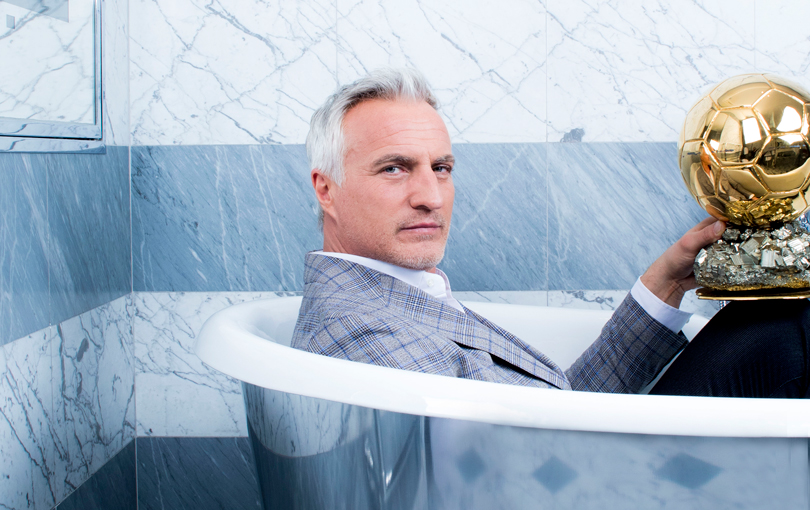
“I would love to, because Newcastle was my first club in the Premier League and they deserve better,” reveals Ginola, who made a quick recovery from a heart attack in 2016.
“Geordies deserve one of the biggest clubs in the country, in Europe, in the world. They’ve got the potential, but for many years things have been done in very weird ways that haven’t made the club better. I want to see Newcastle being very successful and not only in terms of results, but its stability and how they work with the academy. There were Geordies in our side and they gave us something crucial – the heart of the club, the passion. I have so many ideas and I’d love to put something in place – the way I see football, with everyone aiming for the same thing, like a family. You need to explain to the supporters, ‘We have a project, and I’ll tell you exactly what it is’.
“If I worked for Newcastle, it would be so easy to say, ‘I’m going to buy a Spanish guy, a French guy, an Italian guy, a German guy and I’ll make the team great’. That’s an easy way: you’ve got the money and you buy all the best players around. But I’d want to bring the academy players to the first team, a bit like Barcelona under [president] Joan Laporta with Messi, Busquets, Pique, Xavi and Iniesta. When you’re a foreigner and you arrive at Barça, you see that most of the players were at the academy, and they’re the soul of the club. You need a soul – that’s what’s going to make you win titles.”
Titles eluded Ginola and ‘The Entertainers’ in 1996, but they came agonisingly close. The Frenchman was arguably the biggest star of the best Newcastle team in more than half a century, then became one of Tottenham’s greatest players of the Premier League era. “Can you tell us who you are?” journalists asked when he first arrived on English shores. During seven years in the Premier League, he left no one in any doubt. By the time he hung up his boots, everyone knew David Ginola.
While you're here, subscribe to FourFourTwo today and save 37%. All the exclusive interviews, long reads, quizzes and more but with more than a third-off normal price.
NOW READ
LEICESTER TRANSFER NEWS Arsene Wenger claims he did all he could to sign Jamie Vardy
GUIDE Premier League live stream best VPN: how to watch every game from anywhere in the world
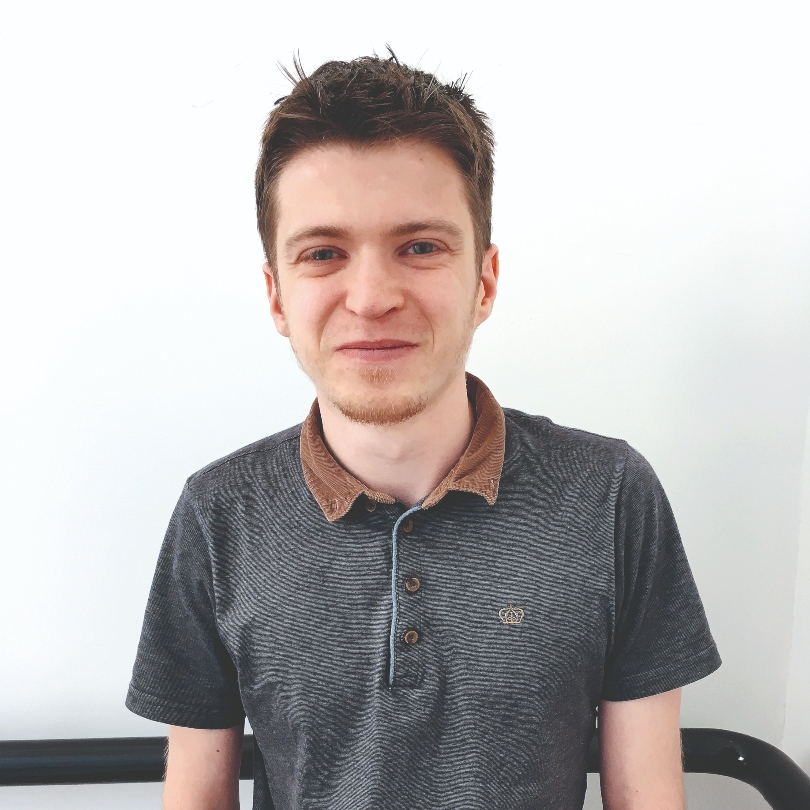
Chris joined FourFourTwo in 2015 and has reported from more than 20 countries, in places as varied as Ivory Coast and the Arctic Circle. He's interviewed Pele, Zlatan and Santa Claus (it's a long story), as well as covering the World Cup, AFCON and the Clasico. He previously spent 10 years as a newspaper journalist, and completed the 92 in 2017.
